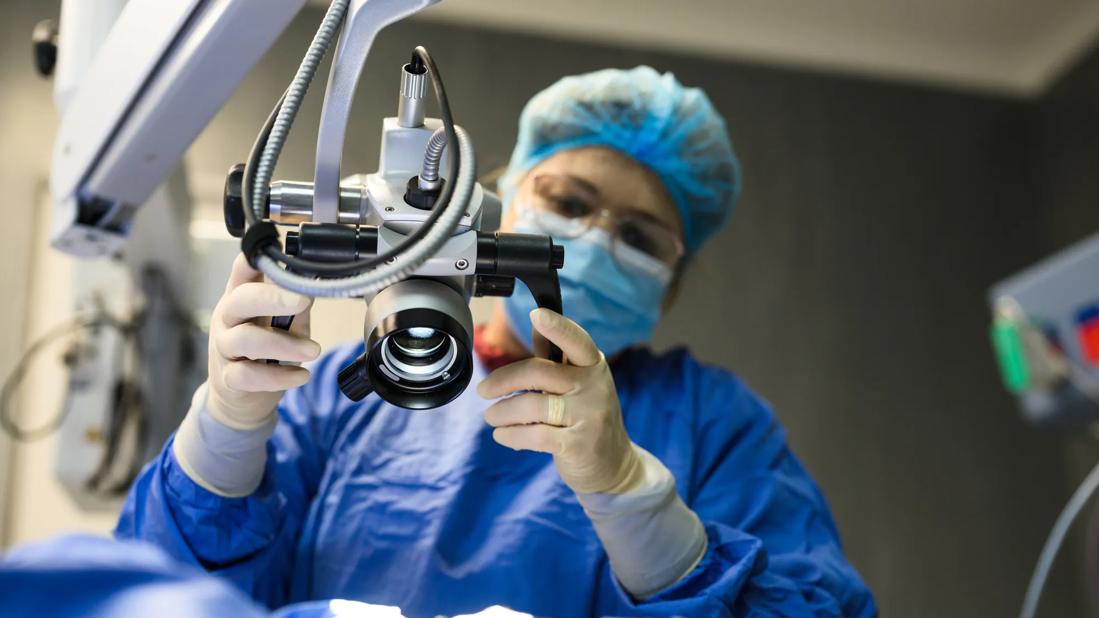Your eyes may sting or burn for a few hours after surgery — that’s why your surgeon will recommend a nap

Image content: This image is available to view online.
View image online (https://assets.clevelandclinic.org/transform/83ea2805-45c2-4e54-b7a8-55db5e061c09/lasik-eye-surgery-1972416418)
Healthcare provider positioning microscope in operating room for refractive surgery procedure
If you’re thinking about LASIK surgery or have your appointment on the books, you probably have questions. You’ve heard the seemingly miraculous stories of people getting LASIK one day and waking up with 20/20 vision the next.
Advertisement
Cleveland Clinic is a non-profit academic medical center. Advertising on our site helps support our mission. We do not endorse non-Cleveland Clinic products or services. Policy
But it can sound too good to be true. LASIK is surgery after all. And surgery isn’t exactly known to be pain-free.
So, you wonder: Does LASIK hurt?
Overall, most people don’t describe LASIK as necessarily painful. But there are times during the process that you might be less than fully comfortable, says optometrist Jason Marcellus, OD.
“Your refractive surgery team should talk with you about what to expect before, during and after LASIK and fully prepare you,” Dr. Marcellus emphasizes. “It’s important to know that you may have some discomforts and that it’s completely normal.”
During LASIK surgery itself, you shouldn’t feel any pain.
“We place numbing drops in your eyes so that you don’t feel pain during refractive surgery,” Dr. Marcellus shares.
What will you feel?
You may notice a bit of pressure as the lasers work to shape your cornea. Most people describe it as the feeling you get when you put a contact lens in your eye.
You might also notice a brief moment of suction. That’s the machine holding your eye in place. Weird? Sure. Painful? Nah.
You may feel some pain after your LASIK procedure, after the numbing drops wear off. When you leave your surgeon’s office, your eyes will still be numb, and the world might look like you’re looking through dirty glasses.
Advertisement
It takes about an hour to two hours for the numbing drops to wear off. When they do, you may feel some pain — like a stinging or burning sensation that makes it hard to keep your eyes open. And your eyes may water.
“During LASIK, we create a flap in your cornea and reshape the tissue underneath. When you blink, it irritates that flap. It’s like touching a hangnail — it stings,” Dr. Marcellus explains. “The good news is that it goes away in an hour or two. And if you take a nap, you might sleep right through it.”
Longer term, you may feel discomforts like dry eye or itchiness in the months after LASIK. But will that hurt?
Probably not, says Dr. Marcellus.
Remember that some of the nerves in your eye get cut during your LASIK procedure. That keeps the center of your eye numb long after the numbing drops wear off.
“After LASIK, a lot of people experience dry eyes. But they don’t necessarily feel it because that part of the eye can stay numb for several weeks,” he adds.
You can avoid most pain following a LASIK procedure by closing your eyes, taking over-the-counter pain relievers and using artificial tears regularly.
Here’s what Dr. Marcellus recommends:
All in all, LASIK shouldn’t be painful. And if the discomforts last more than a few hours after surgery, a call to your surgical team is appropriate.
“Most people should have a follow-up appointment the day or two after surgery, so if you’re in pain, it’s definitely something to bring up,” Dr. Marcellus advises.
Chances are, the next day you’ll be feeling just fine. And your vision? Good as gold.
Advertisement

Sign up for our Health Essentials emails for expert guidance on nutrition, fitness, sleep, skin care and more.
Learn more about our editorial process.
Advertisement
Expect to be seeing clearly just 24 hours after LASIK surgery
The first three days can be tough — but easier days are ahead
PRK and LASIK are both laser eye surgeries that can help you see better, but they’re different in technique, recovery time and who can benefit
Both procedures are about equally effective, but which is better depends on your vision needs and current conditions
The plain answer is ‘no’ — ingredients meant to clean and disinfect your contact lenses can cause irritation, redness or dryness to your eyes
Cosmetic procedures such as iris implants and corneal tattooing bring a risk of vision loss
Consume caffeinated foods and drinks in moderation, if you have them at all
OTC meds, rest, fluids and an anti-inflammatory diet can help you get through big and small weather changes
Prioritize your health by managing stress, strengthening your social connections and getting quality sleep
Bolsters, blankets, pillows and blocks can offer extra support, stability and comfort
Allergies, postnasal drip, asthma or reflux could be to blame for a cough that won’t quit